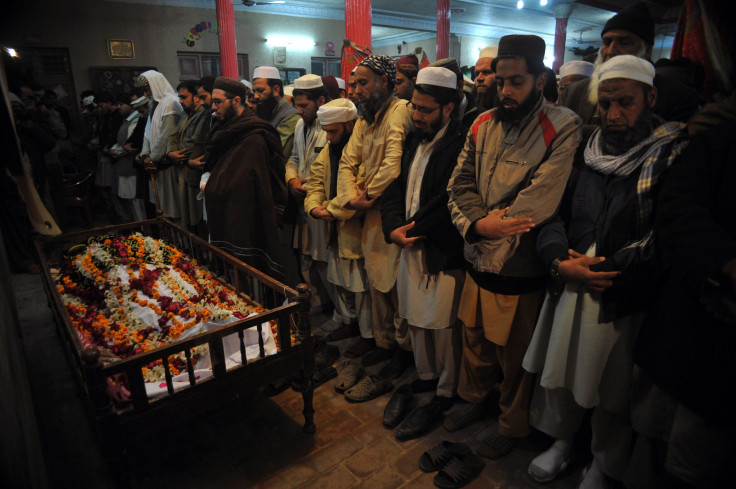Peshawar Attack Highlights Pakistan's Contradictory Approach To Different Strains of Taliban

The grisly siege Tuesday of a military-run school in Peshawar, Pakistan, resulting in the loss of 141 lives -- 132 of them children -- was claimed by an organization called Tehreek-e-Taliban Pakistan (TTP), also known as the Pakistani Taliban. The militant group, which has killed thousands of Pakistanis since it was founded in 2007, said the deadly attack was an act of revenge for the Pakistan military’s offensive against TTP’s strongholds in the Pakistani tribal areas on the Afghanistan border.
The attack in Peshawar highlights Pakistan’s policy of taking a hard line against TTP, which it has deemed the “bad” Taliban, as opposed to the other seemingly “good” Taliban that has received tacit approval from the Pakistani government. While they ultimately serve the same extremist ideology, the Pakistani Taliban is a different group altogether from the Afghan Taliban, which was in power in Afghanistan up until the U.S.-led invasion in 2001 and continues to operate as an insurgent movement. And it was the Pakistani Taliban that was the target of the military’s “comprehensive operation” in June.
“The ‘good’ Taliban are viewed as those who do not attack the state of Pakistan but attack its enemy states, such as India, or Afghanistan when it’s not totally on Pakistan’s side,” said Raza Rumi, a senior fellow at the U.S. Institute of Peace and a consulting editor of Pakistan’s Friday Times.
“If we say that the Pakistani government supports the Taliban, and we say that the Pakistani government is the target of the Taliban, we are telling the truth in both instances,” wrote Daniel Markey, senior fellow for South Asia at the Council on Foreign Relations. Because the Afghan Taliban have said they won’t target the Pakistani state, he added, they receive safe haven from the Pakistani government -- despite providing assistance and training to the Pakistani Taliban.
“The security establishment in Pakistan tends to distinguish between militants that target the Pakistani state and those that do not,” said Michael Kugelman, senior associate for South Asia at the Woodrow Wilson International Center for Scholars. “There are groups like the Afghani Taliban, the Haqqani Network and Lashkar-e-Taiba that don’t target the state, and Pakistan’s relationship with them has been very murky, extending sometimes to sponsorship and cooperation in past years.”
But the Pakistani Taliban has been targeting the Pakistani state and its army since the group’s inception in the mid-2000s: It was responsible for the shooting of Nobel laureate Malala Yousafzai, the Marriott bombings in Islamabad, the assassination of former Prime Minister Benazir Bhutto, the recent attacks on Karachi’s airport, and a host of other deadly offenses.
As a result, “Pakistan has been at war with the TTP for several years now,” said Zarrar Khuhro, an editor at Dawn, Pakistan’s oldest English-language newspaper. “In the military, there is clear thinking that these guys need to be taken out. Serving generals and even Pakistani intelligence members have been targeted by the Pakistani Taliban.”
Tuesday’s attacks, then, serve to provide Pakistan with further justification for its battle against the Pakistani Taliban alone.
But critics both from both inside and outside the country say that this seemingly contradictory approach against extremist groups cannot be sustained. “If [Pakistan] glorifies certain jihadis, like the ones targeting Kashmir or India, then the jihad industry remains operative,” said Rumi. “The Pakistani Taliban are offshoots of that jihad industry. They are both the consequence of and contributors to that jihadi infrastructure. So until there is a national consensus that none of them are in the interest of Pakistan, this issue will not be resolved.”
Markey says that the Peshawar attack may spark a shift in public attitudes about the Taliban. “Parts of the Pakistani political class, including Imran Khan, had been pushing the idea that dialogue with the Pakistani Taliban was the only way to go forward,” said Markey. Since the attack, Khan, the country’s leading opposition politician who has been calling for Prime Minister Nawaz Sharif’s ouster, has canceled an upcoming national protest. “It raises the questions about whether this weakens Khan politically and whether there will be a deeper dialogue about the Pakistani Taliban within society.”
Fasi Zaka, a Pakistani columnist and radio host based in Islamabad, says he doubts the massacre in Peshawar, as horrific as it was, will portend any real change. “It’s happened multiple times before. When Malala was shot, it was seen as possibly the watershed moment,” he said. “But look at the diatribes against her today in Pakistan -- people question her motives and her sponsors.” Still, he points to the new army chief Gen. Raheel Sharif’s claims of wanting to stamp out all kinds of extremism -- not just certain strains -- as a hopeful sign.
But Farahnaz Ispahani, a former member of the Pakistani parliament and a public policy scholar at the Wilson Center, remains grim in her outlook. “Unfortunately, we’ve seen many massacres and blasts in Pakistan. I don’t see the military establishment changing its course, nor do I see civilian politicians having the will or the courage to stand up in a united way,” she said. “Anyone who tries to speak up against militant extremists is accused as a traitor.”
“Even though Pakistan differentiates between ‘good’ and ‘bad’ militant groups, they are cut from the same cloth," said Kugelman. "And in some cases they have even fought together, so it’s a dangerous game for the Pakistani military to try to keep one set of militants at arm’s length and aggressively go after the other.”
Markey agrees. “There has to be a pervasive recognition among the intelligence and military community that groups like the Afghani Taliban are more costly than they’re worth,” he said. “It could be a galvanizing moment -- a wakeup call that they need to go after all of them.”
© Copyright IBTimes 2024. All rights reserved.











